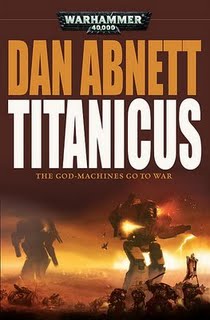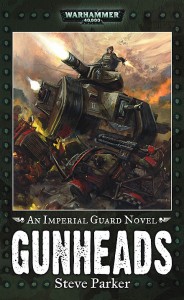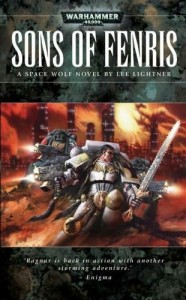 Titanicus is a 40k novel by Dan Abnett that I had been planning to read for some time, prompted by my buddy Matt (who also lent me the book).
Titanicus is a 40k novel by Dan Abnett that I had been planning to read for some time, prompted by my buddy Matt (who also lent me the book).
From the opening of the novel the Imperial forge world Orestus is struggling under a full-fledged, Titan supported Chaos assault. Rationale for the Chaos assault is never made terribly clear, but presumably simple, basic control of the planet and its many manufactorums is the goal. Wrapped up in a larger crusade through the system, few Imperial reinforcements are offered to bolster the planet’s defense. However, the forge world finally manages to convince the Legio Invictus to countermand their orders and attempt to save Orestus. Invictus eventually succeeds in slowing the invasion, but the planet is thrown into turmoil when revelations are made that shake Imperial faith to its core, threatening to rive the the Mechanicus between old and new factions. Worse, the Chaos action is revealed at that moment of weakness to be much, much more than was originally understood…
The plot of Titanicus is a solid action oriented flick with just enough deeper elements thrown in to be interesting. An awful lot can be learned about the Adeptus Mechanicus by reading this novel, much more than I had previously picked up. It covers skitarii warriors, Titans, supporting battalions, and the inner sanctum of the Mechanicus in great detail. A fair bit can also be picked up about the non-military aspects of the Empire. Lives of common citizens, government, and commerce in the forge world are nicely covered alongside the battles.
As usual, Abnett handles the action very well. He has a knack for covering just enough action to be exciting, without going on too long and having it wear thin. In particular, the Titan battles are just detailed enough when interesting, but simplified and made more abstract when not. This is taken just a bit too far in the ultimate, super sized battle, which is perhaps a tad too abstract, but is otherwise greatly appreciated—Titan battles frequently aren’t actually all that interesting, consisting mostly of giant, lumbering machines pouring nearly limitless rounds of ammunition into each other. They can be better, when there’s more movement and tactics, but they’re frequently not and shouldn’t be belabored; Abnett makes those calls well. In return, the internal workings of the machines, the bindings between man and machine spirit, and relations among the crew are all generally more engrossing, and this book places an appropriate amount of emphasis on that aspect. Skitarii battles are similarly done very well, conveying the sheer chaos, mayhem, speed, size, and brutality of these supercharged, swirling brawls excellently. Glimpses of the Planetary Defense Forces and the outworld inhabitants beyond the hives are also great. The early descriptions and the closing moments in the nomad waypoint shack are very memorable and personal in a way often missing in the hard, all-action 40k universe.
Where this book falls slightly short is character development. The characters are almost all reasonably compelling, sympathetic when appropriate, and very readable, but there’s not much development throughout the novel. There could have been more, but it falls just short. Notably, there’s no development on the Chaos side—in fact, there are literally no Chaos characters at all. This is unfortunate, as Chaos Marines present a wealth of potentially deep characters. The invading forces instead merely come across as an implacable, unthinking wall, without motivation or personality.
The controversial truths are managed about as well as could be expected for a franchise novel that must accord with an extensive assemblage of background canon. Relations between the Empire and the Adeptus Mechanicus are enrichened and made more complex, but nothing’s really provably thrown away in the process. As usual, truth is flexible in the 41st millenium, and the rabbit hole goes as deep as you want, in whatever direction you want to move.
All in all, Titanicus is a solid, good 40k novel, though it shouldn’t be read as a first 40k novel as it requires a fair amount of background to really get the most out of it. The novel could be a little deeper and stronger, but it is a great source of Mechanicus and general Imperial knowledge, as well as being an entertaining trip well worth the time.
 Rolling on with book reviews, next is Gunheads by Parker. This relates the story of trying to reclaim Yarrick’s long lost Fortress of Arrogance from the Orks on Golgotha. Meanwhile, the Adeptus Mechanicus is using that expedition as cover to reclaim another artifact recently discovered by scouts in the same region of the planet. Manipulated by the Mechanicus, a large contingent of Imperial Guard assaults the planet, aiming to fight through to where the Mechanicus *swears* Yarrick’s legendary Baneblade is to be found. Recovering the vehicle of course turns out not to be as simple as planned, with the Guard embroiled in many heinous battles with the Orks that have overwhelmed the planet and become ginormous in their ceaseless fighting, and the Mechanicus throwing many curveballs and betrayals along the way.
Rolling on with book reviews, next is Gunheads by Parker. This relates the story of trying to reclaim Yarrick’s long lost Fortress of Arrogance from the Orks on Golgotha. Meanwhile, the Adeptus Mechanicus is using that expedition as cover to reclaim another artifact recently discovered by scouts in the same region of the planet. Manipulated by the Mechanicus, a large contingent of Imperial Guard assaults the planet, aiming to fight through to where the Mechanicus *swears* Yarrick’s legendary Baneblade is to be found. Recovering the vehicle of course turns out not to be as simple as planned, with the Guard embroiled in many heinous battles with the Orks that have overwhelmed the planet and become ginormous in their ceaseless fighting, and the Mechanicus throwing many curveballs and betrayals along the way.